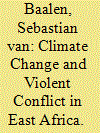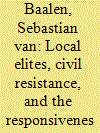|
|
|
Sort Order |
|
|
|
Items / Page
|
|
|
|
|
|
|
| Srl | Item |
| 1 |
ID:
163750


|
|
|
|
|
| Summary/Abstract |
How does climate change affect the risk and dynamics of violent conflict? Existing research shows that climate change can increase the risk of violent conflict and significantly alter the dynamics of existing conflicts. Less is known about the exact mechanisms through which climate change affects violent conflict. In this article, we address this lacuna in light of the first systematic review of both quantitative and qualitative scholarship. Through an analysis of forty-three peer-reviewed articles on climate-related environmental change and violent conflict in East Africa published 1989–2016, we evaluate to what extent the literature provides coherent explanations that identify relevant mechanisms, actors, and outcomes. In addition, we discuss the expected temporal and spatial distribution of violence and the confounding political factors implied in the literature. Against this background, we offer a number of suggestions for how future climate-conflict research can theorize and explore mechanisms. Future research should distinguish between explanations that focus on causes and dynamics of climate-related violent conflict, theoretically motivate when and where violence is most likely to occur, systematically examine the role of state policies and intervention, and explore the implications of each explanation at the microlevel.
|
|
|
|
|
|
|
|
|
|
|
|
|
|
|
|
| 2 |
ID:
182663


|
|
|
|
|
| Summary/Abstract |
Why is rebel governance more responsive in some areas than in others? In recent years, scholars have started to examine the determinants of rebel governance. Less attention has been given to explaining variation in the responsiveness of rebel governance, that is, the degree to which rebels are soliciting and acting upon civilian preferences in their governance. This article seeks to address this gap by studying local variation in rebel responsiveness. I argue that rebel responsiveness is a function of whether local elites control clientelist networks that allow them to mobilize local citizens. Strong clientelist networks are characterized by local elite control over resources and embeddedness in local authority structures. In turn, such networks shape local elites’ capacity for mobilizing support for, or civil resistance against, the rebels, and hence their bargaining power in negotiations over rebel governance. Drawing on unique interview and archival data collected during eight months of fieldwork, as well as existing survey data, the study tests the argument through a systematic comparison of four areas held by the Forces Nouvelles in Côte d’Ivoire. The analysis indicates that the strength of local elites’ clientelist networks shapes rebel responsiveness. Moreover, it provides support for the theorized civil resistance mechanism, and shows that this mechanism is further enhanced by ethnopolitical ties between civilians and rebels. These findings speak to the burgeoning literature on rebel governance and to research on civil resistance. In addition, the results inform policy debates on how to protect civilians in civil war.
|
|
|
|
|
|
|
|
|
|
|
|
|
|
|
|
|
|
|
|
|